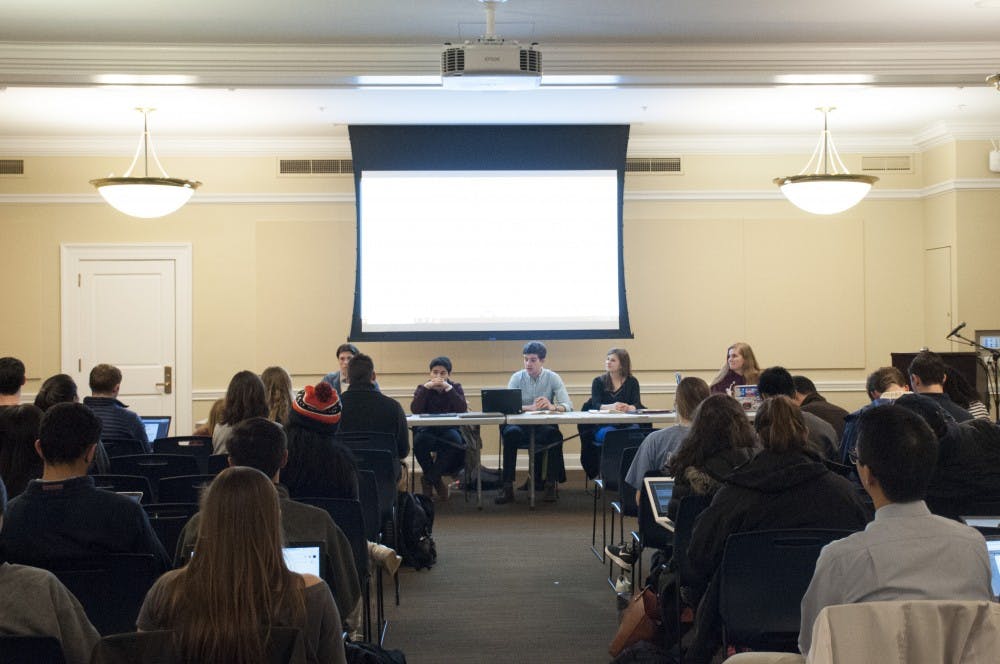A proposed amendment to Student Council’s constitution to implement a presidential veto power was rejected by the student body in a University-wide referendum this week, with just under 63.3 percent of students supporting the amendment. According to the Student Council constitution, “two-thirds of those voting must vote in favor of the amendment during elections.”
Under the amendment, the Student Council president would have had a veto power that can be exercised over the elected Representative Body, but it could have been overridden by a two-thirds majority vote of representatives.
Voter turnout in this referendum was approximately 14.4 percent, according to results released Friday by the University Board of Elections.
Sarah Kenny, a fourth-year College student and outgoing Student Council president, said in a previous interview with The Cavalier Daily that the amendment was meant to create a connection between the representative and executive branches of Student Council.
“[This referendum] gives the president of student council veto power over the representative student body,” Kenny said. “So right now the president does not have any sort of say over the legislation that guides the presidential branch that that officer oversees. And so this is mirroring how our checks and balances system works on the federal level, but it creates a sense of connection between the executive and the representative branch of the government.”
Some of the candidates running for Student Council president were divided on the issue.
Eddie Lin — a third-year College Student and former Student Council representative who was defeated by third-year College student Alex Cintron for Student Council president Friday — said in a previous interview that the amendment would give the executive body of Student Council too much power over the representative.
“I completely disagree with the veto,” Lin said. “I think the Executive Board does not need any more power over the representative body. And I think in the past executive power has tried to dominate the Representative Body in ways that in my opinion that are just not necessary. So I think there's no reason to just grant another.”
Cintron has said he thought that the amendment would have allowed for the executive and representative bodies to check the other’s power.
“I think it makes sense and I think it would actually allow for more collaboration and more competition between reps and the president because at that point you're in the dealmaking process,” Cintron said. “You have to get to a table and talk about the issues and see what is acceptable and what isn't acceptable. And your representatives could successfully and officially serve as the check to the executive and honestly, this organization needs checks and balances.”
The student body approved three other referenda proposed by Student Council.
One referendum will incorporate gender-neutral pronouns into the the Student Council’s constitution and was approved with 76.2 percent of the vote. The second clarifies term commencement for representatives as “between thirty and sixty days after the end of spring elections at the discretion of the outgoing executive board and school enrollment of elected representatives” and was approved with 76.6 percent of the vote. The third adds to the Student Council constitution that candidates for “Representative seats must be elected by the School that they will represent for the coming term” and was approved with 67.4 percent of the vote.
“Gender-neutral language is something that we’re kind of taking the lead on,” Kenny said. “In the socio-political moment, it’s the right thing to do, and Honor and UJC have done it as well.”
A referendum proposed by the Honor Committee to integrate gender-neutral pronouns in its constitution was also approved Friday with 83.5 percent of the vote.
Devin Rossin, a fourth-year College student and Honor Committee Chair, said in a previous interview that this referendum demonstrates to the student body that the Honor Committee is an ally to all students and is in step with the rest of the University to improve inclusivity.
The student body approved a similar amendment to the University Judiciary Committee’s constitution last spring by replacing instances of the words “his,” “he” or “chairman” with “his or her,” “he or she” or “chair.”
A referendum proposed by the University Board of Elections to amend its member selection and appointment process was also approved Friday with 78.3 percent of the vote. Under the approved amendment, outgoing UBE administrations will have the power to determine the number, title and scope of the incoming chair and vice chair positions. After appointment, the UBE chair and vice chair would have the ability to appoint other members to the board at their sole discretion.
Previously, a selection committee — composed of the outgoing Student Council President, Honor Committee Chair, UJC Chair, Fourth Year Trustees President and the UBE Chair — appointed the entire board. However, the committee will now only appoint the chair and vice chair, who will then select the other members of the board.
The referendum also added gender-neutral language to the UBE’s constitution.
Casey Schmidt, a fourth-year College student and chair of UBE, said in a previous interview with The Cavalier Daily that the proposed amendment seeks to address the issue of membership appointment by giving the incoming chair and vice chair of the board greater power to choose who sits on their committee.
“I think that one thing the UBE has struggled with in the past sometimes is getting enough people recruited in the first go-round in spring,” Schmidt said. “What this ideally would do is allow a bit more autonomy to have the chair and vice chair have their own recruitment process after they’re in office and bring in people that they really want to have on their board ... and incorporate them in more smoothly.”
Correction: A previous version of this article misstated that the veto amendment was approved. The amendment failed because it failed to garner the required two-thirds support of student voters.







